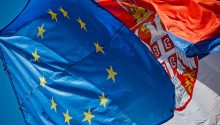by Ian Proud, Strategic Culture:

As Central European countries like Slovakia grow restive about the anti-democratic creep of Brussels, the European Commission has increased its pressure on aspiring EU Members like Serbia to cut engagement with Russia and impose sanctions instead. This augurs poorly for the European project.
Slovakian Prime Minister, Robert Fico and Serbian President Aleksandar Vučić plan to attend the May 9 Victory Day parade in Moscow, to commemorate the 80th anniversary of the end of World War II. The big difference is that while Slovakia is an EU Member State, Serbia only hopes to be, one day.
TRUTH LIVES on at https://sgtreport.tv/
Kaja Kallas, the EU High Representative for Foreign Policy and Security intoned after an EU Foreign Ministers’ meeting on 14 April that ‘any participation in the 9 May parades or celebrations in Moscow will not be taken lightly on the European side, considering that Russia is really waging a full-scale war in Europe.’
The foreign Minister of Latvia, Baiba Braže, weighed in, pointing to ‘discussion on the values and alignment of CFSP, including sanctions, including very clear guidance from EU member states for the candidates not to participate in the 9th May parade in Moscow and not to do those trips as it would not be in line with the EU values.”
Jonatan Vseliov, the Secretary General of Estonia’s Foreign Ministry was more blunt saying, ‘we need to ensure that they [Serbia] understand that certain decisions come at a cost. The consequence is them not joining the European Union.’
The internal procedures of the European Union have been weaponised to such an extent that threats and blackmail have become normalised. Since 2020, a change in the EU accession process means that individual Member States can block a candidate country at every stage of the process.
Serbia’s efforts to progress on Cluster 3 of the accession process – competitiveness and inclusive growth – has been stuck now for several years, despite apparently being well placed institutionally to commence negotiations.
An attempt by Hungary to secure agreement for Cluster 3 negotiations to start in December 2024 was blocked by seven EU countries, including the usual suspects – Estonia, Latvia and Serbia’s neighbour Croatia. The reasons cited were Serbia’s refusal to impose economic sanctions on Russia, its ‘unclear geopolitical orientation’, and relations with Kosovo.
The balanced line Serbia has taken between its relations with Europe and its relations with Russia will be a major sticking point in Brussels for as long as President Vučić is in power.
Vučić has often called for dialogue and for a peaceful resolution to the war in Ukraine. That doesn’t mean he agrees with Moscow on everything; he doesn’t recognise Crimea as Russian, for the same reasons that Serbia does not recognise Kosovar independence. But as he points out, relations between states in the Balkans and in the former Soviet space are complex, and dialogue is vitally important, despite considerable differences in certain areas.
It is simply incorrect to say that every aspect of Serbian foreign policy is pro-Russian. Yet, and, as with Georgia, the war in Ukraine, coupled with Europe’s continued democratic overreach, has prompted Eurocrats in Brussels to force a binary choice on Serbia – ‘you’re either with us or with Russia’.
Read More @ Strategic-Culture.org




